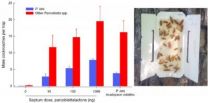(Press-News.org) Overeating may cause brain aging while eating less turns on a molecule that helps the brain stay young.
A team of Italian researchers at the Catholic University of Sacred Heart in Rome have discovered that this molecule, called CREB1, is triggered by "caloric restriction" (low caloric diet) in the brain of mice. They found that CREB1 activates many genes linked to longevity and to the proper functioning of the brain.
This work was led by Giovambattista Pani, researcher at the Institute of General Pathology, Faculty of Medicine at the Catholic University of Sacred Heart in Rome, directed by Professor Achille Cittadini, in collaboration with Professor Claudio Grassi of the Institute of Human Physiology. The research appears this week in the Proceedings of the National Academy of Sciences USA (PNAS).
"Our hope is to find a way to activate CREB1, for example through new drugs, so to keep the brain young without the need of a strict diet," Dr Pani said.
Caloric restriction means the animals can only eat up to 70 percent of the food they consume normally, and is a known experimental way to extend life, as seen in many experimental models. Typically, caloric-restricted mice do not become obese and don't develop diabetes; moreover they show greater cognitive performance and memory, are less aggressive. Furthermore they do not develop, if not much later, Alzheimer's disease and with less severe symptoms than in overfed animals.
Many studies suggest that obesity is bad for our brain, slows it down, causes early brain aging, making it susceptible to diseases typical of older people as the Alzheimer's and Parkinson's. In contrast, caloric restriction keeps the brain young. Nevertheless, the precise molecular mechanism behind the positive effects of an hypocaloric diet on the brain remained unknown till now.
The Italian team discovered that CREB1 is the molecule activated by caloric restriction and that it mediates the beneficial effects of the diet on the brain by turning on another group of molecules linked to longevity, the "sirtuins". This finding is consistent with the fact that CREB1 is known to regulate important brain functions as memory, learning and anxiety control, and its activity is reduced or physiologically compromised by aging.
Moreover, Italian researchers have discovered that the action of CREB1 can be dramatically increased by simply reducing caloric intake, and have shown that CREB is absolutely essential to make caloric restriction work on the brain. In fact, if mice lack CREB1 the benefits of caloric restriction on the brain (improving memory, etc.) disappeear. So the animals without CREB1 show the same brain disabilities typical of overfed and/or old animals.
"Thus, our findings identify for the first time an important mediator of the effects of diet on the brain," Dr. Pani said. "This discovery has important implications to develop future therapies to keep our brain young and prevent brain degeneration and the aging process. In addition, our study shed light on the correlation among metabolic diseases as diabetes and obesity and the decline in cognitive activities."
### END
Eating less keeps the brain young
Italian scientists discovered a molecule for 'brain longevity' turned on by diet
2011-12-19
ELSE PRESS RELEASES FROM THIS DATE:
Brain function - A new way to measure the burden of aging across nations
2011-12-19
Cognitive function may be a better indicator of the impact of aging on an economy than age-distribution, with chronological age imposing less of a social and economic burden if the population is "functionally" younger, according to a study published today in the Proceedings of the National Academy of Sciences.
The study finds that one standardized indicator of cognitive ability - memory recall - is better in countries where education, nutrition, and health standards are generally higher. Aging populations are of concern to many countries as it is often assumed that ageing ...
Legumes give nitrogen-supplying bacteria special access pass
2011-12-19
A 125-year debate on how nitrogen-fixing bacteria are able to breach the cell walls of legumes has been settled. A paper to be published on Monday by John Innes Centre scientists reports that plants themselves allow bacteria in.
Once inside the right cells, these bacteria take nitrogen from the air and supply it to legumes in a form they can use, ammonia. Whether the bacteria breach the cell walls by producing enzymes that degrade it, or the plant does the work for them, has been contested since an 1887 paper in which the importance of the breach was first recognised.
"Our ...
Researchers find misinformation about emergency contraception common in low-income neighborhoods
2011-12-19
Boston – Researchers from Boston Medical Center (BMC) and Boston University School of Medicine (BUSM) have found that in low-income neighborhoods, misinformation about access to emergency contraception is a common occurrence. These findings appear as a research letter in the Dec. 19 on-line issue of the Journal of the American Medical Association.
In 2009, the U.S. Food and Drug Administration facilitated access to emergency contraception among adolescents by making it available over-the-counter to individuals age 17 years and older.
From September to December 2010, ...
Targeting EETs to treat cardiovascular disease may prove a double-edged sword
2011-12-19
Boston, Mass. – A group of small molecules called EETs – currently under scrutiny as possible treatment targets for a host of cardiovascular diseases – may also drive the growth and spread of cancer, according to researchers at the Dana-Farber/Children's Hospital Cancer Center (DF/CHCC) and other institutions. Their findings also raise the possibility that drugs that block EETs could serve as a new avenue for cancer treatment.
This study, led by Dipak Panigrahy, MD, of DF/CHCC and the Vascular Biology Program at Children's Hospital Boston, appeared online December 19 ...
Cockroach hookup signal could benefit endangered woodpecker
2011-12-19
A North Carolina State University discovery of the unique chemical composition of a cockroach signal – a "Let's hook up" sex pheromone emitted by certain female wood cockroaches to entice potential mates – could have far-ranging benefits, including improved conservation of an endangered woodpecker.
Dr. Coby Schal, Blanton J. Whitmire Professor of Entomology at NC State and the corresponding author of a paper describing the discovery, says that the study, published the week of Dec. 19 in Proceedings of the National Academy of Sciences, advances the knowledge of fundamental ...
Wayne State study finds soybean compounds enhances effects of cancer radiotherapy
2011-12-19
Detroit - A Wayne State University researcher has shown that compounds found in soybeans can make radiation treatment of lung cancer tumors more effective while helping to preserve normal tissue.
A team led by Gilda Hillman, Ph.D., professor of radiation oncology at Wayne State University's School of Medicine and the Barbara Ann Karmanos Cancer Institute, had shown previously that soy isoflavones, a natural, nontoxic component of soybeans, increase the ability of radiation to kill cancer cells in prostate tumors by blocking DNA repair mechanisms and molecular survival ...
Infrared technology for measuring the effect of fire on materials
2011-12-19
This press release is available in Spanish.
The main problem associated with measuring the effects of fire on materials lies in the temperature of the flames, which reaches over 1000 ºC and can obscure the actual temperature of the material. In addition, there is the problem of the high concentration of gasses (CO2, H2O and others), which makes it difficult to obtain clear images of the sample being subjected to fire. In order to solve this problem, the UC3M scientists who developed this method used a measurement that utilizes the infrared spectrum. "To do this, ...
First aid after tick bites
2011-12-19
This press release is available in German.For years, Mrs. S. suffered from joint pain and headaches. After an odyssey through doctors' waiting rooms, one doctor diagnosed Lyme borreliosis – an infectious disease transmitted by ticks. With its bite, the parasite introduced bacteria that then spread throughout the entire body. Mrs. S. is not alone – very often, the disease is recognized too late or not at all, or is not properly treated. Doctors are provided with no clues if the characteristic redness around the bite area is missing. Left untreated, Lyme borreliosis can cause ...
Ultra-compact dwarf galaxies are bright star clusters
2011-12-19
Astronomy & Astrophysics is publishing the results of a detailed investigation of how many 'ultra-compact dwarf galaxies' (UCDs) can be found in nearby galaxy clusters. UCDs were recognized as a populous and potentially distinct class of stellar systems about a decade ago. But they are still mysterious objects that are characterized by a compact morphology (30-300 light-years in size) and high masses (more than one million solar masses). More generally, their properties (e.g., their size, shape, or luminosity) are similar to those of both star clusters and dwarf galaxies. ...
Article Catalog, a New Article Directory, Offers Free Search Engine Optimization Opportunities for All
2011-12-19
Article Catalog, a new article directory, launched today, Thursday, 15 December, 2011.
The site offers users free, unlimited submissions of articles to its directory. Articles are categorized by industry and have to be a minimum of 300 words and a maximum of 2000 words in length. The site is available to companies worldwide and is visually appealing, and has an easy-to-use, straightforward login system and an aesthetically pleasing interface design.
"The idea behind launching this directory was to offer another article marketing opportunity for companies looking ...
LAST 30 PRESS RELEASES:
Bureaucracy Index 2026: Business sector hit hardest
ECMWF’s portable global forecasting model OpenIFS now available for all
Yale study challenges notion that aging means decline, finds many older adults improve over time
Korean researchers enable early detection of brain disorders with a single drop of saliva!
Swipe right, but safer
Duke-NUS scientists identify more effective way to detect poultry viruses in live markets
Low-intensity treadmill exercise preconditioning mitigates post-stroke injury in mouse models
How moss helped solve a grave-robbing mystery
How much sleep do teens get? Six-seven hours.
Patients regain weight rapidly after stopping weight loss drugs – but still keep off a quarter of weight lost
GLP-1 diabetes drugs linked to reduced risk of addiction and substance-related death
Councils face industry legal threats for campaigns warning against wood burning stoves
GLP-1 medications get at the heart of addiction: study
Global trauma study highlights shared learning as interest in whole blood resurges
Almost a third of Gen Z men agree a wife should obey her husband
Trapping light on thermal photodetectors shatters speed records
New review highlights the future of tubular solid oxide fuel cells for clean energy systems
Pig farm ammonia pollution may indirectly accelerate climate warming, new study finds
Modified biochar helps compost retain nitrogen and build richer soil organic matter
First gene regulation clinical trials for epilepsy show promising results
Life-changing drug identified for children with rare epilepsy
Husker researchers collaborate to explore fear of spiders
Mayo Clinic researchers discover hidden brain map that may improve epilepsy care
NYCST announces Round 2 Awards for space technology projects
How the Dobbs decision and abortion restrictions changed where medical students apply to residency programs
Microwave frying can help lower oil content for healthier French fries
In MS, wearable sensors may help identify people at risk of worsening disability
Study: Football associated with nearly one in five brain injuries in youth sports
Machine-learning immune-system analysis study may hold clues to personalized medicine
A promising potential therapeutic strategy for Rett syndrome
[Press-News.org] Eating less keeps the brain youngItalian scientists discovered a molecule for 'brain longevity' turned on by diet


